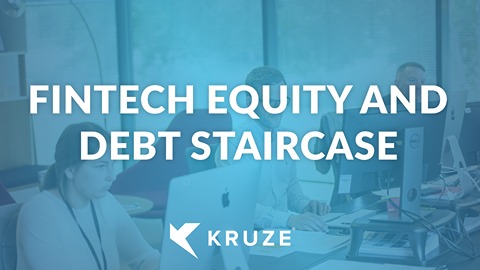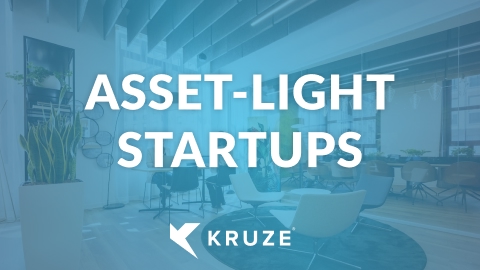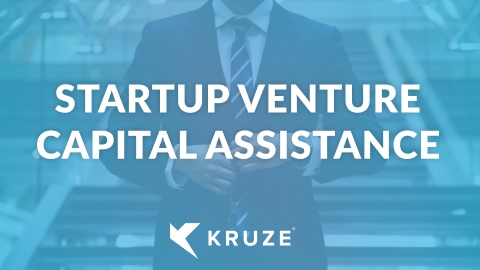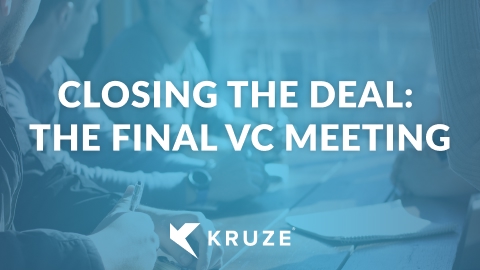Convertible notes often referred to as “converts,” are one of the most important securities used to fund early-stage startups.
While their popularity has declined some since the introduction of SAFEs, they continue to be one of the most common types of investments raised by seed-stage companies and are often used during Series A, Series B, etc. extension rounds.
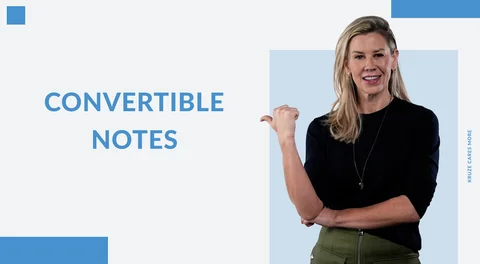
Vanessa Kruze CPA, Kruze Consulting CEO
Kruze knows converts
As a trusted advisor to companies that have raised billions in seed and venture capital funding, the team at Kruze Consulting knows a LOT about converts.
From how to account for a convertible note on the balance sheet to what discounts and caps do to the capitalization table, we’ve seen it all. Let’s dive in and share some of our learnings about this important security.
What is a Convertible Note?
What is a convertible note or convertible debt? Simply put, convertible notes or debt is one of the primary mechanisms that startup investors, like angels and seed funds, can invest in early-stage startups that are NOT ready for a formal valuation.
Essentially, in exchange for the money that the angels and seed-stage funds give the startup, they get a piece of paper called convertible debt. This convertible debt will allow them to make a little bit of interest while the note is outstanding. The note will typically mature in 20 to 24 months.
A convertible note has both a maturity date and a set of conditions/milestones at which it automatically converts into equity. These conversion triggers are typically tied to when the startup raises equity, usually in the form of preferred equity.
Convertible notes may come with a valuation cap, and they may also have a conversation discount. The valuation cap, if the note has one, establishes the maximum valuation at which the note will convert into equity. The discount (also called discount rate, conversion discount, etc.) provides a mechanism for compensation the investor for the risk they took holding the note. The effect of the discount is to decrease the per share price that the note holder ‘pays’ to receive equity,
At the time of maturity, the investor will either get their money back, roll it over and extend, or convert it to equity if a new round has come in.
What is a Convertible Note in Venture Capital
A convertible note in venture capital is a form of short-term debt that converts into equity, typically in conjunction with a future financing round. In the context of venture capital, it is a tool used by startups during early-stage funding. It’s popular because it’s less complex and costly than a standard equity round.
Example: A very common valuation for super early-stage startups might be around a five or $10 million valuations or cap. So, say investors put in $1 million at a $5 million valuation on the cap on the convertible debt. Then a year later, the startup raises a Series A preferred round at a $20 million valuation. This investment triggers the conversion of the note into the same security that the Series A investors are getting. And, it’s excellent news for the convertible debt investors because they are going to convert their notes at a $5 million valuation. So they will own approximately 20% of the company, even though they put in only a million dollars. The angels and seed-stage funds get a ton of leverage from investments that go well and raise a future round at a much higher valuation.
Again, convertible notes are always set to convert when that next giant slug of equity comes in, typically like a Series A preferred stock.
A couple of things worth noting, convertible debt is generally compared against SAFE notes. Convertible debt was what everyone used for many years, and then Y Combinator and a couple of law firms came out with SAFE notes that are a little more friendly for founders. Safe notes don’t have a maturity date or interest. Therefore, the founder is not paying interest on the money while they are doing it.
But those are only the two significant differences. Otherwise, SAFE notes and convertible debts are very close.
If founders are working with ethical and experienced angels or seed-stage funds, they are not going to hold you hostage over the maturity date. Still, there are some not-so-great people out there sometimes, in the startup ecosystem, and so occasionally convertible debt; you have to be careful. You want to negotiate as long of a maturity date as possible. And again, there are convertible notes that are uncapped, meaning there is no kind of set valuation that they will convert. That means they will convert at the next round.
Usually, they get a slight 15 or 20% discount. However, that uncapped note is not popular with investors because the investors are giving companies their money now. Startups will then use that money to improve the company, generate sales, and build a product. In the future, that company will raise funds at a much higher valuation than it could have received. The investors get penalized for that. So, often, investors will push back on uncapped convertible notes. They want that cap in there; they want to know what they convert.
We do not typically recommend doing too many different convertible debt rounds. It is nice to get that conversion to happen into preferred equity. Get your cap table cleaned up, get it set. That way, founders know exactly how much ownership they have. Investors will also want to know what that ownership looks like as well. Plus, if you have multiple discounts and caps calculating, understanding, and articulating your capitalization table to your investors - and prospective investors - becomes very challenging.
So again, convertible debt is typically faster and cheaper than a preferred round, and so that’s one of the reasons that super early-stage founders like to use it. And if you have any other questions on convertible debt, feel free to contact us.
Convertible Notes vs Convertible Debt
Founders often ask us to explain the difference between convertible notes and convertible debt. The short answer is that, in the venture capital world, convertible notes and convertible debt are interchangeable terms. They really mean the same thing.
Public Company Convertible Notes- How Does a Convert Differ for a Public Company vs. a Startup?
There are times when public companies will be more apt to issue convertible notes rather than stocks. When public companies feel that their shares are trading below value, typically during a downturn, they will give a convertible note because it pays less interest. The terms and features of these notes are rather different than the ones used by early-stage venture capital investors, although the basic concepts are similar.
This will offset the value of allowing investors to convert their stocks into money and saves the company money.
While shares are trading at lower prices, companies may decide that convertible bonds are the way to go. This way, they will avoid complex agreements with bondholders accompanying conventional debt offerings.
What are Typical Convertible Note Terms?
Convertible notes are a very popular way to raise capital, especially with angel investors. Investors will usually share a term sheet prior to the serious legal part of signing a deal with a startup. The convertible note term sheet is basically a negotiating tool to determine the main terms of the deal, and so startup founders who are raising capital should make sure they are getting standard deal terms (we always recommend working with a top startup law firm!)The convertible debt term sheet should at least consider these points:
- Amount: What you are raising from investors.
- Interest Rate: Convertible notes are debt and typically have a nominal interest rate, usually 2%- 5%.
-
Valuation or Conversion Cap: The valuation the investor’s note converts at:
- Angel investors are incentivized to take the risk early on.
- Most heavily negotiated term outside of the amount.
- Conversion Discount: Not all notes have discounts, but many do. Typical ranges are 0% (for no discount) to 30%, with 20% seeming to be industry standard at the moment. More on how the discount works below.
- Liquidation Preference: Whether the note converts to common or preferred stock.
- Length: Typically 18-24 months, as a founder negotiate the most extended length possible.
- Bridge Round: After a company raises capital from an institutional investor, the inside investors will bridge the company to give them a longer cash runway; this is typically raised as convertible notes.
This is not an all-inclusive list; investors and companies may have other important items. Again, make sure you are working with an experienced lawyer who knows startup financing.
How does the discount on a convertible note work?
As we’ve already mentioned, the discount on a convertible note provides early investors some compensation for the risk that they took holding the note. The note’s discount creates a reduction at which the convertible note will convert relative to the price of the next round. The note investor gets to convert their investment (and any interest) into shares at a discount paid by the investors in the round.
Typical discounts are 0% to 30+%, with 20% being common.
Sample legal language from convertible note documents
Here are some example legalese defining the discount in convertible note documents that we’ve seen, from most straightforward to quite wordy. Note we are not lawyers, and do not provide any legal advice. If you are raising a convert, hire an experienced lawyer!
“Conversion Price” means an amount equal to the Next Financing Price multiplied by 80%.
“Note Conversion Price” means the lowest per share purchase price paid for the Qualified Financing Securities by the investors of new money in the Qualified Financing, multiplied by 0.80.
Effective upon the closing of a Qualified Financing, all of the outstanding principal and interest under this Note will automatically be converted into shares of the same series of preferred stock issued to other investors in the Qualified Financing at a conversion price equal to 80% of the price per share of Qualified Financing Securities paid by the other investors in the Qualified Financing.
What is a Convertible Promissory Note?
- A debt tool for investors or lenders to give a startup capital.
- Seen most in early stages (Pre-Seed, Seed, Series A).
- Idea is for the security to convert from debt into equity at the next funding round.
- Typically have a conversion cap, which places a maximum valuation that the investors will pay for their shares at conversion.
- May have a discount.
- There are times that a convertible promissory note is used for a bridge round.
- Straightforward tool and easy to document!
Read more about convertible promissory notes here.
How to allocate Pro-Rata correctly on Convertible Notes done in between Priced Rounds?
Convertible Notes vs. Priced Rounds in Venture Capital
When exploring funding options for startups, two prevalent methods often considered are convertible notes and priced equity rounds (of course, as we’ve already mentioned, SAFEs have become more popular than converts in most cases). Understanding the distinctions between these can be crucial for both founders and investors in making informed decisions.
Comparing Convertible Notes and Priced Rounds
- Valuation: Convertible notes allow deferring valuation, while priced rounds require a set valuation at the time of investment.
- Complexity and Cost: Convertible notes are generally less complex and cheaper to execute compared to priced rounds.
- Investor Risk: Convertible notes carry more uncertainty for investors, as their future equity stake depends on the eventual valuation of the company. Most experienced investors are understanding and accepting of this risk, although they may prefer (and aggressively negotiate for) a priced round. And some just don’t do converts, so it’s best to ask.
- Equity Dilution: Priced rounds immediately dilute ownership for existing shareholders, while convertible notes delay this dilution until conversion.
The choice between convertible notes and priced rounds depends on several factors, including the startup’s stage, the need for a quick funding solution, and the willingness of founders and investors to accept valuation uncertainty. Both options have distinct advantages and drawbacks, and the right choice varies based on individual circumstances. In general, we see pre-seed, some seed and most extension rounds choosing a convertible instrument these days (although, again, SAFEs are way more popular these days).
This is what happens when a startup defaults on a convertible note
A convertible note is one way that pre-seed or seed investors use to invest in startups that aren’t ready for valuation. The convertible notes start as short-term debt and the investors are repaid with equity in the startup, rather than principal and interest payments, once a specific milestone, like another funding round, has been reached. That’s when the startup is officially valued.
When the convertible note comes due
Angel investors know that when they invest in a startup, the startup is going to spend that money to develop their product. But if the startup reaches the note’s maturity debt and hasn’t raised more cash, the angel investors can ask for their money back. If that money’s been spent, there’s no way to repay the investors.
What happens to a convertible note if a company goes bankrupt?
At that point, if the startup itself has some value, the investors can join other creditors and petition for bankruptcy. Convertible note investors are typically ahead of equity investors, but behind venture debt and other debt holders, in a liquidation process. There is a process that creditors can follow, and investors can use the note to exert pressure on the startup to liquidate the company.
Do note holders get a tax write off if a company goes bankrupt and the investors lose their money?
Note holders should consult their tax CPA around the specific documentation they should seek from the failed startup to take a loss on their tax returns, but in general, failed convert investments can be written off by the note holders - again, consult with your tax CPA as individual situations may vary.
Extending the convertible note
Most often, angel and seed investors will just extend the convertible notes. If the startup is making progress, the founders usually ask the investors to extend the note for six months or a year so that they can do more fundraising. That’s what happens in the vast majority of cases, and it’s very rare that investors will force a bankruptcy.
However, the possibility that investors could force bankruptcy contributed to the rise of SAFE notes (simple agreement for future equity). SAFE notes are an agreement with allows an investor to buy a specified amount of shares at an agreed-upon price at some point in the future. SAFE notes are not considered debt; they are equity, and there’s no maturity date.They’re becoming more popular for early-stage fundraising. If you have other questions on seed funding, or questions on startup accounting and tax compliance, please contact us.
Summary: How does a convertible note work?
A convertible note is a type of investment vehicle that is often used by startups to raise capital from investors. It is a short-term loan that converts into equity in the company at a later date, typically when the company raises a subsequent round of financing or achieves a certain milestone. A major advantage of this type of funding is that it does not require negotiation around valuation, as the instrument converts into shares at the next major financing - of course, many notes have valuation caps and valuation discounts.
How it works
Here’s how a convertible note works, assuming the company does well and is able to raise a solid financing round at a later date:
- The startup issues a convertible note to an investor, which includes the terms of the loan, such as the interest rate, maturity date, and conversion terms (such as valuation caps and discounts)
- The investor lends the startup a certain amount of money, which the startup uses to fund its operations and grow the business.
- At the next major financing event, the convertible note converts into equity in the company. The conversion terms specify the number of shares the investor will receive and the valuation of the company at the time of conversion.
Convertible notes are often used by startups because they provide flexibility in terms of valuation and allow the company to delay determining a valuation until it has more information about its financial performance and market conditions. They are also less time-consuming and expensive to negotiate than traditional equity financing.
